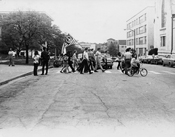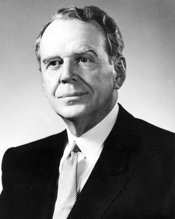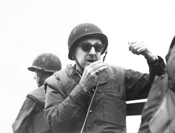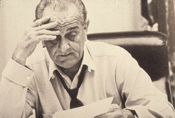- Exhibits
- Tet Offensive
- Political Consequences
The Tet Offensive (Tết Mậu Thân)
- The Tet Offensive (Tết Mậu Thân)
- Hue: The Imperial City
- The Battle of Khe Sanh
- The Battle for Saigon
- Aftermath of the BattlesPolitical ConsequencesExhibit Credits
Political Consequences

Protestors march across street near the University of Texas at Austin campus
(Terry J. DuBose Collection [va043290])
P-167605 The Pentagon Washington, D.C. 1968 Honorable Clark M. Clifford, Secretary of Defense. Defense Dept. Photo (Marine Corps) rcc A416371
(Peter Braestrup Collection [va035240])Though the Tet Offensive turned out to be a major military victory for the Americans and South Vietnamese, it quickly turned into a political defeat, as shocking images of the offensive began appearing on the televisions of millions of Americans who had been led to believe that the war was coming to an end. Images of the fighting within the walls of the American Embassy, the intense fighting during the Siege of Khe Sanh, and the prolonged struggle at Hue had made a significant impact on the psyche of the American public. In response to the horrors of the Tet Offensive, many Americans began to question whether or not the war was winnable, and to doubt the wisdom of further American participation in the conflict. As a result, the anti-war movement gained in intensity as hundreds of thousands of Americans took to the streets to call for an end to the fighting. Many in the American press also began to publicly criticize American involvement in Vietnam. Of particular importance was the opinion of CBS Evening News anchor Walter Cronkite, one of the most trusted members of the American media. After personally witnessing the horror and destruction of the Tet Offensive during a visit to some of the major battle sites, Cronkite candidly declared on a CBS Evening News broadcast that the best the United States could hope for in Vietnam was a stalemate.
"To say that we are closer to victory today is to believe, in the face of the evidence, the optimists who have been wrong in the past. To suggest we are on the edge of defeat is to yield to unreasonable pessimism. To say that we are mired in stalemate seems the only realistic, yet unsatisfactory, conclusion. On the off chance that military and political analysts are right, in the next few months we must test the enemy's intentions, in case this is indeed his last big gasp before negotiations. But it is increasingly clear to this reporter that the only rational way out then will be to negotiate, not as victors, but as an honorable people who lived up to their pledge to defend democracy, and did the best they could."
To President Lyndon Johnson, Cronkite’s words were devastating. In response to the editorial, Johnson was quoted as saying, "If I’ve lost Cronkite, I’ve lost middle America."
In the wake of the Tet Offensive and the backlash that followed, President Johnson began reconsidering his position on Vietnam. After receiving advice from Secretary of Defense Clark M. Clifford, Johnson made the decision to deny a requested troop escalation of an additional 206,000 fighting men for Vietnam. Believing that additional forces would not bring America any closer to victory in Vietnam, Johnson decided to end the war’s escalation. With that decision, the wheels were set in motion for a gradual withdrawal from the conflict. In addition to the impact that Tet had on the war itself, the offensive also had a major impact on the American political landscape. Tet had come during an election year, and early opinion polls showed that President Johnson was losing the support of the American public. As a result of the political backlash that followed Tet, Johnson shocked the American public during an address to the nation on 31 March 1968, by announcing that he would not seek reelection. With that decision, Johnson became yet another casualty of the Vietnam War. However, he would not be the last, as American involvement in the war continued for another five years.
Vietnam Center & Sam Johnson Vietnam Archive
-
Address
Texas Tech University, Box 41041, Lubbock, TX 79409 -
Phone
(806)742-9010 -
Email
vnca@ttu.edu



